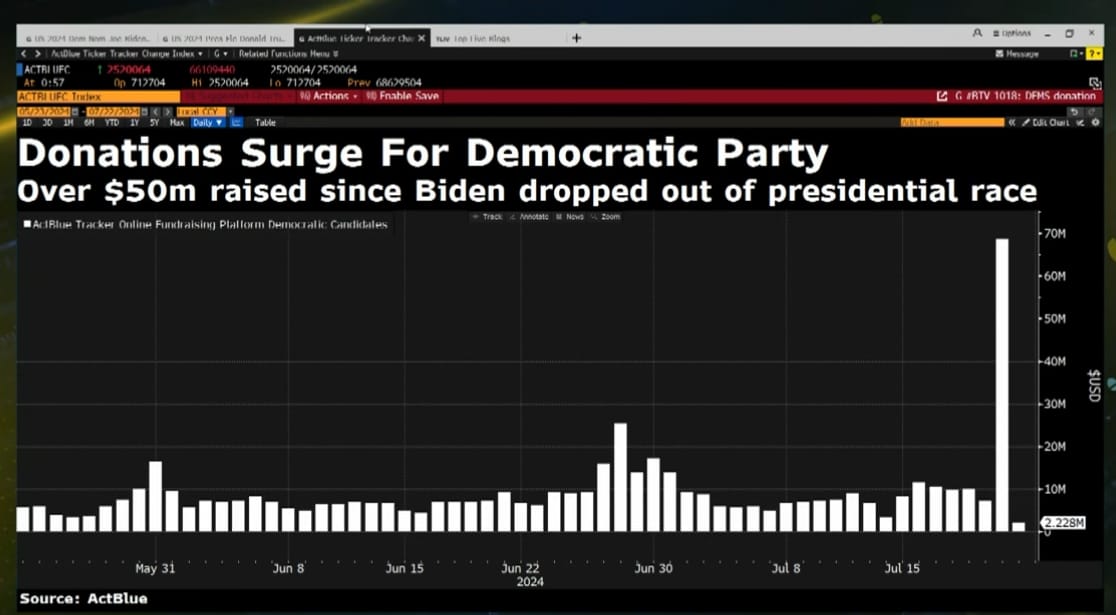The big news coming into. this week was President Biden withdrawing from the race and endorsing VP Kamala Harris as the candidate for the Democratic Party. By now this is not news, but what is pouring in gradually is the support. Bloomberg reported yesterday that the Democratic Party donations had surged and crossed $50 million since the withdrawal, and VP Harris’ campaign reportedly reached $81 million (a record sum for this election).

As far as the candidacy is concerned, we’re yet to hear a formal nomination. The announcement would normally take place during the convention scheduled for Aug 19-22 but, we may see early “virtual” voting by Aug 1 and a candidate announcement by Aug 7. VP Harris is the easiest choice right now, given the Democrats are so late in the game. It also means that she can access the campaign funds that were being channeled for the Biden-Harris campaign.
But, the big question everyone is asking is whether VP Harris is a strong enough contender to beat former President Trump, whose odds have increased substantially over the past few weeks.
Historically, it’s never been easy for a VP to win an election on the heels of their former president, as they aren’t viewed as a strong enough candidate. People may also view it as still voting for President Biden, by proxy and the change that people are looking for may be watered down. Nevertheless, the odds for VP Harris winning are certainly rising and maybe this is a change, given she will be running against a former President as well.

Source: BBG / Deepak Mehra
The immediate reaction we saw yesterday in the markets was also the unwinding of some of the Trump 2.0 Trades because this news has gradually started to lower the odds of a Republican sweep.
The focus over the next few weeks will likely be:
How much support VP Harris gets to become the presidential candidate - as of Monday, VP Harris got the required number of delegates for the Democratic Presidential Nomination. The official announcement is yet to be made.
How the DNC sets the agenda for the next few months
Who will be Harris’ running mate? That could really define her campaign and her chances of winning. For what it’s worth, both Trump and JD Vance are outspoken and doing the rounds across the country. We’d need to see the same effort from and breadth from the Democratic nominees.
What will Kamala Harris run on? We know she conceded the nomination to President Biden the last time around, and we know little of what she stands for until now. We know she’s tough on crime and that could count in her favor against a convicted, Trump. But, her previous campaign lacked vision and her performance as VP has been lackluster. In contrast, the Republicans and Trump have increasingly made their agenda clear. Nevertheless, there’s still time for her to formulate those policies and run an effective campaign. This could work in her favor to create a renewed “first” impression on the American voter.
We are not concerned with politics but with policies and how they may affect the markets.
We did a compare and contrast between Biden and Trump on policies before the last debate. The likelihood of policy implementation may be stronger if there is an election sweep. The odds of an election sweep have risen in the past few weeks (favoring the Republicans) and this is being seen as a new tail risk among some fund managers.

Election Sweep is a new concern with 12% seeing this a tail risk
For us, we want to know what Harris’ policies will be for the economy, US debt, business sectors, and to a certain extent geopolitics. We know that overall the policies are not likely to deviate significantly from President Biden’s but, there will be certain issues that she’s likely to push forward further.
Immigration:
A former lawyer, Harris will likely take a more legislative approach on immigration similar to the Biden Administration. She has been vocal against Trump’s immigration policies, particularly family separations at the border. She supports reinstating protections for DACA recipients and advocates for comprehensive immigration reform that includes a pathway to citizenship for undocumented immigrants.
This may work against her in some states who are staunchly against more liberal immigration policies.
What it means for the markets: Immigration has been a source of employment and job creation. This could keep the unemployment rate relatively low and help the Fed’s Agenda of a gradual reduction in rates. If unemployment starts to spike, the Fed will need to aggressively cut rates.
On the flip side, immigration has also been a source of rent increases, some inflation, and growth through consumption. Most of the immigrants entering the workforce, however, are relatively lower-wage workers, so they have not contributed as much to sticky wages. The net result of softer immigration policies could mean a smoother easing cycle for the Fed.
